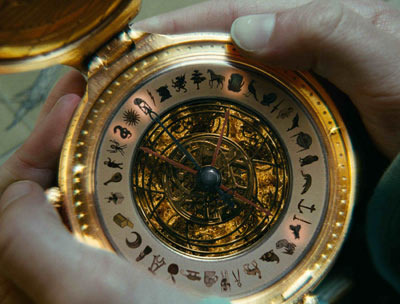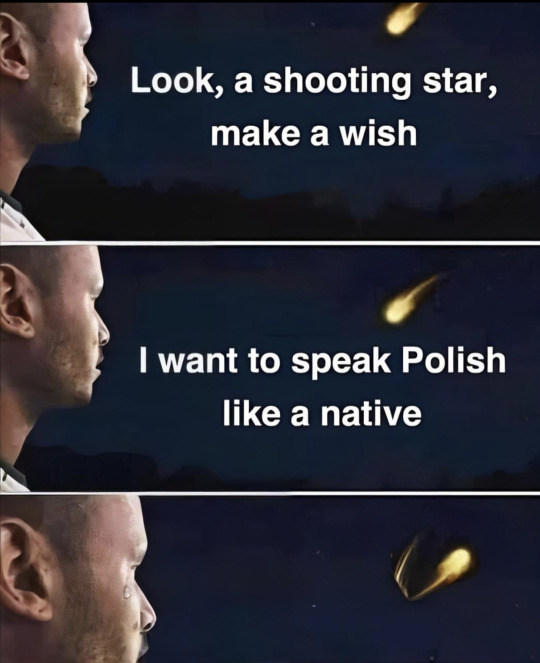#native speaker
Explore tagged Tumblr posts
Text
The Golden Compass of Our Linguistic Intuitions
From hakoret-harishona . com
October 30, 2018

One of Philip Pullman's loveliest ideas in his book The Golden Compass (1995) is an instrument called "an alethiometer". The alethiometer resembles a golden clock or compass, but instead of the hours in the clock, there are 36 little pictures – an anchor, an hourglass, a beehive and so on – around its rim. The instrument has three hands that can be arranged to point at any of the pictures, and a fourth, longer hand that can swing freely. The image above is a photo of the alethiometer from the film version of The Golden Compass.
The book's protagonist, a girl called Lyra, receives such an instrument, and later on hears an explanation regarding the origin of its name. The word alethiometer is derived from aletheia (ἀλήθεια), "truth" in Ancient Greek; an alethiometer is thus a "truth-meter".
"All these pictures round the rim … they're symbols, and each one stands for a whole series of things. Take the anchor, there. The first meaning of that is hope, because hope holds you fast like an anchor so you don't give way. The second meaning is steadfastness. The third meaning is snag, or prevention. The fourth meaning is the sea. And so on, down to ten, twelve, maybe a never-ending series of meanings … I know some, but to read it fully I'd need the book. I seen the book and I know where it is, but I en't got it. … You got three hands you can control … and you use them to ask a question. By pointing to three symbols you can ask any question you can imagine, because you've got so many levels of each one. Once you got your question framed, the other needle swings round and points to more symbols that give you the answer.'
'But how does it know what level you're a-thinking of when you set the question?'
'Ah, by itself it don't. It only works if the questioner holds the levels in their mind.'"
Choosing a Meaning
As a rule, then, the readers of the alethiometer use books to look up the relevant meanings of the symbols. Lyra doesn't have the books, and in any case, she's an uneducated child. However, as she plays around with the alethiometer, she soon realizes that without any books, she can read it, ask questions and understand the answers. The longer she uses the alethiometer, the better she gets at it. When asked "how do you know where these meanings are?" she answers "I kind of see 'em. Or feel 'em rather, like climbing down a ladder at night, you put your foot down and there's another rung. Well, I put my mind down and there's another meaning, and I kind of sense what it is. Then I put 'em all together."
I recently read Pullman's new book, a prequel to The Golden Compass. And as I read it, I realized that the alethiometer can be seen as a metaphor to the process of speaking, comprehending and even acquiring language.
Words, like the symbols in the alethiometer, have many meanings, often related. Some of them have dozens of meanings – as we can see by considering a few examples, or looking them up in a good dictionary. When we speak (or write), we must choose words that have meanings suitable to what we wish to say; when we decipher what has been said to us (or what we read), we must understand, like the readers of the alethiometer, which of a word's meanings is now relevant. Does since mean "from that time on" or "because"? Does wave indicate the rising of water, the movement of a hand, an oscillating electric field, or something that football fans do at a stadium? The relevant meaning of a word, like the relevant meaning of one of the alethiometer's symbols, is chosen or made clear by the complete message.
The process of choosing the relevant meaning happens when we phrase a message – speak, or ask a question of the alethiometer – as well as when we decipher one. In the quotation below, Lyra explains how she's asking the alethiometer "what's Mrs. Coulter doing now" (Mrs. Coulter is Lyra's mother).
"Well, the Madonna is Mrs. Coulter, and I think my mother when I put the hand there; and the ant is busy – that's easy, that's the top meaning; and the hourglass has got time in its meanings, and partway down there's now, and I just fix my mind on it."
Similarly, when we speak, we choose words that express the message we wish to deliver, i.e. words that one of their meanings suits what we wish to say. In the sentence "I called her but the line was busy", for example, there are several words with multiple meanings; if I say this sentence, I must have chosen called because one of its meanings is "phoned", and busy because one of its meanings is "currently in use". Once the message is created, we hope the person who receives it will decipher it correctly – will recognize, from among the different meanings of each word (or combination of words), the meaning we are trying to convey; that they, as Lyra put it, put their foot down and find another rung, put their mind down and find another meaning, and then put 'em all together.
So far it makes sense. Pullman's alethiometer can be seen as a metaphor, beautifully and poetically made, for symbolic communication. In the terms used by the linguist Ferdinand de Saussure, every sign is composed of a signifier and a signified; the alethiometer's symbols, like words in a language, are signifiers, and each one of them can, and indeed does, stand for several signified objects. Identifying the right meaning, in human communication as well as in reading the alethiometer, is a task that requires thought and an act of choosing.
How Many Levels? Perhaps a Never-Ending Series: Meanings, Register, Connotation, Context

Using words, however, entails much more than choosing one of several possible meanings. Words have not only meanings, but also a register: the words child and kid have a common meaning, but one is much less formal than the other. Words have not only a denotation, a primary and literal meaning, but also a connotation – the cultural and emotional associations that they carry with them; thin and slender have a similar meaning, but thin is basically neutral whereas slender has a positive connotation. Some words are commonly used in certain contexts, which can be very specific. Ginger is used to indicate a reddish color, but only for hair or fur (we wouldn't usually say "a ginger sunset"). Blonde is used even more specifically – only for hair: we say "a ginger cat", but we don't normally say "a blonde cat".
All these characteristics of words and their usage – the different meanings, the register, the connotations and the typical context – are somewhat similar to the "levels of meaning" in Pullman's alethiometer. There is the “first level” mentioned by Lyra, the level of the most common meaning, which will probably be the first meaning we learn as we acquire the language; but every word has multiple layers. This is most easily felt when someone uses a word in an unusual context or manner, or misinterprets a word when it is used to indicate a less common meaning. These kinds of mistakes are typical of non-native speakers – people who learned this particular language as second or third language, but have a different language as their native tongue.
The Alethiometer as a Mother Tongue
We thus reach another layer in Pullman's lovely metaphor. Most of the alethiometer's readers are scholars, meaning – adults. To them, using the alethiometer is a skill that requires learning, from books or from another scholar, and they need a book detailing the meanings of the symbols in order to phrase questions and comprehend the answers they receive. The child Lyra, on the other hand, acquires the ability to communicate with the alethiometer without requiring a book or a teacher. She toys with the alethiometer, looks at the pictures, moves the hands and follows the movement of the needle, and soon intuitively comprehends the meanings of the symbols: "I kind of see 'em. Or feel 'em rather". Her communication with the alethiometer is so fast and intuitive that this ability becomes a huge asset to her side in the war described in the book: by the time the enemy's adult reader has asked a question and deciphered the answer, her side has gained precious hours.
Does this difference remind you of something? I was reminded of the difference between mother-tongue and second-language acquisition. Children acquire their mother tongue easily and naturally, with no need for formal teaching or a dictionary. All it takes is for people to use it in their presence (and later – to talk to them). Adults, as a rule, require formal teaching. Even then, and after many years of practice, the second language is still a second language, and its deeper levels might still be missing, resulting in misunderstandings or peculiar phrasings.
Towards the conclusion of His Dark Materials trilogy, of which The Golden Compass is the first volume, Lyra has grown from a child to a young woman, and is horrified to realize that she has lost her ability to read the alethiometer. How did this happen? An angel explains to her that her ability to read the alethiometer has been given to her "by grace", and is now gone. Pullman does not explicitly indicate Lyra's growing up as the reason for this loss of grace, the ability to read the alethiometer intuitively; but she's told she can re-learn it "by work" – patiently, formally, with the use of books, and she decides to do so.
All of us, like Lyra, enjoy a period of grace in our childhood. One in which we can acquire a language effortlessly, just by hearing it. All of us, like Lyra, lose this ability as we grow up. Yet like Lyra, we can still learn a new language, and delve deeper and deeper into it, with hard work, patience and books.
#language#linguistics#philip pullman#his dark materials#the golden compass#hdm#writing#alethiometer#first language#mother tongue#second language#symbols#meaning#truth#words#communication#childrens literature#booklr#books#ya literature#native speaker#the book of dust#lyra#lyra silvertongue#lyra belacqua#long post#interesting#language learning#study#literature
43 notes
·
View notes
Text

From Chang-rae Lee’s Native Speaker
8 notes
·
View notes
Text
Yes, your Hebrew teacher should absolutely be a native speaker!
And I say that as someone who’s been a translator, educator, and writer for almost 30 years now (wow, that makes me feel old 😳😆)
It’s a necessary starting point — but it’s just the first box your teacher should check.
What makes me a better teacher isn’t just being a native speaker.
It’s being a native speaker who truly understands the language.
(You know how some English speakers just use English better than others? Same idea — only in Hebrew)
Then, on top of that — I know how to simplify the language.
To explain it in a way that makes sense to you, as an English speaker.
In a way that clicks.
That builds your confidence.
Gives you clarity.
Allows you to focus on what you want to be great at first.
And the icing on the cake?
I care deeply about your success.
This isn’t just my full-time job or business —
It’s my mission.
My passion.
Helping English speakers thrive in Hebrew.
All of that TOGETHER is what makes me the teacher you’ve been looking for.
If you’re a student, drop a 🙌 in the comments so others know they’re in good hands.
#native#native speaker#hebrew#hebrew langblr#language#jewish#israel#hebrewbyinbal#jumblr#langblr#teachers#teacher#teachblr
3 notes
·
View notes
Text
Back on my polyglot shittt. I want to learn French next year. If you’re a native speaker or can speak really well, message me ❤️❤️
4 notes
·
View notes
Text
My only reader ick is bad French. Reader is supposed to be a girl but they don't use the correct pronouns 😭😭😭
Send me your flirty suave boys that need good french, I'll do it for free! 🙏 Please 😫
2 notes
·
View notes
Text
You wanna know a nice thing I just realized most people could probably do? Offer to talk to someone learning your first language. Someone looking for a non-judgmental native speaker to practice with? That could be you. They get practice, you get an opportunity to make a new friend. Everyone wins! Your area might even have conversation groups for newcomers that are looking for native speakers to literally just show up and talk to people.
#nice things#ways to help#language learning#and also#just a fun time#native speaker#like I didn’t realize until today#how valuable my ability to speak a language is#to the right crowd
2 notes
·
View notes
Text
aɪɜːrn
I want to know something regarding the pronunciation of the word "iron", and I'm only asking native speakers and those who've been living in an English speaking country since forever (as a child), but it's not quite their native language. The latter is my definition for "second language". And only that. If you went to school in an English speaking country for a couple of years (for example studying abroad), that doesn't count as a second language in this case, please press the last button then.
The description in the poll is only a "more or less", not an absolute.
So...
8K notes
·
View notes
Text
it is so funny to me how i started learning english on my own age 10 because the manga i was reading was turning so so so bad i went to fan content to cope with how shit it was. and 15 years later this pays off as my boss tells me i'm an essential asset in the team as the only fluent english-speaker.
#read yaoi fanfic between two male love interests of a shôjo love corner in your target language and in 15 years#you'll speak and write it better than some natives speakers according to other native speakers. pro tip#neigh (blabbers)
9K notes
·
View notes
Text

Old World Language Families Map. 🗺️🔎
1 note
·
View note
Text

It's the little mundane things that makes you realize you're not a native speaker. Like, what do you call this motion in English? (Impossible to Google)
1 note
·
View note
Text
7) languages are hard to learn so the fact you’ve done that is more than so many people (especially American English speakers) can say and also I don’t think I know a single English speaker who speaks “good” English it’s a MESS of a language
8) (this part goes for those who are native (English) speakers too and aren’t “good” at it it’s okay.) this language makes like no sense and the mechanics are difficult to get a handle of (especially if you have any kind of disability that inhibits language or speech or whatever) there is absolutely no reason to apologize for that but that’s not to say that if you don’t have a disability that makes it harder you have to apologize. there is never a reason to apologizing for communicating!!!!
my blog is, and always will be, a safe place for people who are not confident in their english speaking abilities. you will never be judged or mocked here.
#language#english#English is a mess#English is weird#English is hard#disability#communication#learning languages#native speaker#disabled#intellectual disability#learning disability#seriously though communicating is something that should never be apologized for#even when it’s not perfect you’re still trying and that’s enough
123K notes
·
View notes
Text
Criminal that Hollywood has not green-lit an adaptation of Chang Rae Lee's Native Speaker, because I can totally see John Cho playing John Kwang.
0 notes
Text

#native speaking#native speaker#trolleng#trolledu#make a wish#collocations#verbs followed by to infinitive#verbs followed by full infinitive#full infinitive#want to do something#collocation
0 notes
Text
No but fr having an indigenous family broken up for its own good by the state and one of them leave her homeland to go get a Real Education is not just counter to the original story's characterization, it's not just erasing the colonialism commentary for the sake of failed feminism presumably based on the girlboss objection to portraying women as caretakers and the classist objection to blue collar jobs, it is an act of colonialism.
It is in fact so ridiculously an act of colonialism that it should come off as such to anybody able to think about media critically for a few moments, but to anybody familiar with what the US did to many indigenous peoples via the faux benevolence of boarding schools, including to native hawaiians, it's fucking revolting.
Like, shoutout to removing Pleakley's gender exploration, to removing the cop villain in lieu of just having the mad scientist remain one, to removing some of Cobra Bubbles's nuance, to removing commentary on race and colonialism, etc etc, but mainly: this did a colonialism.
#lilo and stitch#in case anyone's got that tag filtered#man i do not like making any kind of personal allusions to things on tumblr#because sometimes i feel like tumblr demands personal information in order to validate opinions#in ways that are beyond just making sure affected peoples of oppression are heard on their topics#and i have no interest in being sorted into an easy box when that does not describe my whole experience#for the sake of being imbued with Speaker for the Monolith status#but like this fr made me sick#i am not native hawaiian but i am descended from another indigenous group subjected to the us's boarding schools#there are still living relatives who were affected by this#“but why did nani have to take care of her sister instead of going and getting a degree-- the certificate of true worth as a person”#go fuck yourself disney
2K notes
·
View notes
Text








Oh english is absolutely not his first language.
#Ryunosuke and Phoenix's first day court sillies: I don't know what a court record is! :3 I'm just a little guy!#Apollo first day court sillies: If anyone finds out Im not a native english speaker I will simply have to Murder them#i KNOW they didnt know he was an immigrant when they made this game. Thats why its SO COOL so much of it stil scans and supports later canon#my partner and I were playing together and just talking about how.#he grew up in a mountain shack surrounded by army guys. he KNOWS HOW TO PLAY POKER. He just has no idea what the hands are called in ENGLISH#spk plays apollo justice#ace attorney#apollo justice#apollo justice ace attorney#aa
7K notes
·
View notes